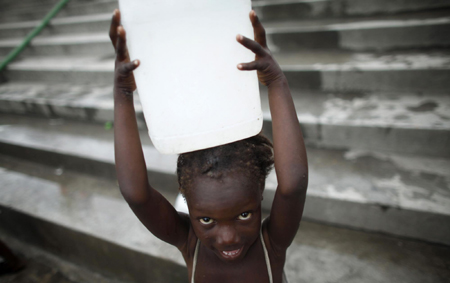Haiti's earthquake death toll rises to 270,000
Haitian president Rene Preval said Wednesday that his government has buried 270,000 bodies since the Jan 12 earthquake.
 |
|
A child carries a bottle of water in Port-au-Prince February 1, 2010. Aid groups and troops from around the world have struggled to distribute food, water and medical care to an estimated 3 million Haitians injured or left homeless in the 7.0-magnitude earthquake that wrecked much of Haiti's capital on Jan. 12, killing as many as 200,000 people. [China Daily via Agencies] |
A third of Haiti's 9 million people were crowded into the chaotic capital when the quake struck just to the southwest a few minutes before 5 pm. Many were preparing to leave their offices or schools. Some 250,000 houses and 30,000 commercial buildings collapsed, according to government estimates, many crushing people inside.
For days, people piled bodies by the side of the road or left them half-buried under the rubble. Countless more remain under collapsed buildings, identified only by a pungent odor.
A few days after the quake, the state-run public works department, known as the CNE, began picking up bodies from the streets and dropping them in trenches dug by earth movers in Titanyen, just north of the capital, amid rolling chalk and limestone hills that overlook the Caribbean Sea.
The trenches are 6 meters deep and piled 6 meters high.
Preval said the government has counted 270,000 bodies during those efforts, and that the number does not include people buried in private ceremonies.
"The trucks were just dropping people wherever, and then we would move in and cover them up," he said. "We buried people all along the roads and roadsides. It was impossible to do a count."
"I personally think that a lot of information being given to the public by the government is estimates," said Haiti's chief epidemiologist, Dr Roc Magloire.
Communications minister Marie-Laurence Jocelyn Lassegue announced Tuesday's death toll, but did not give details about how it was calculated.
"For the moment we count 230,000 deaths, but these figures are not definitive," she said. "It's a partial figure."
"Regarding every estimate, we have to be very careful because we could lose credibility with donors, with humanitarian partners," she told The Associated Press. "If you boost the figure, it's counterproductive. It doesn't help when you try to match assistance to needs."
 0
0 







Go to Forum >>0 Comments